What does the update statement in mysql return?
The return result of the update statement in mysql: 1. When there is no "useAffectedRows=true" parameter in the database URL, the number of matching rows is returned; 2. When there is the "useAffectedRows=true" parameter in the database URL , returns the number of affected rows.

The operating environment of this tutorial: windows10 system, mysql8.0.22 version, Dell G3 computer.
What does the update statement in mysql return?
What is the number of matching rows that the result of the update statement returns? Or does it affect the number of rows?
Let’s talk about the results first: If the url of the database is:
jdbc:mysql://gitlab.fzghjx.com:3306/cron
, then the returned result is number of matching rows (Rows matched).
If it is:
jdbc:mysql://gitlab.fzghjx.com:3306/cron?useAffectedRows=true
, the number of affected rows (Changed) is returned.
To sum up:
If there is no useAffectedRows=true parameter in the url, the number of matching rows will be returned. If so, the number of affected rows is returned.
How to make its return value be the number of affected (changed) records?
Just add useAffectedRows=true to the mysql data connection url parameter
jdbc.url=jdbc:mysql://localhost:3306/ssm?useAffectedRows=true
Expand knowledge:
Guess
If you operate the update statement of mysql through cmd, the screen display is actually like this:

When I think about this problem, first There are two answers to the response. 1. Make a judgment in the return result of the mysql server. If this is set to true, the value of Rows matched is returned. If it is false, the value of Changed is returned. 2. Select this value when returning to the query statement.
Confirmation
Let’s use a diagram to illustrate the entire process of creating a connection:
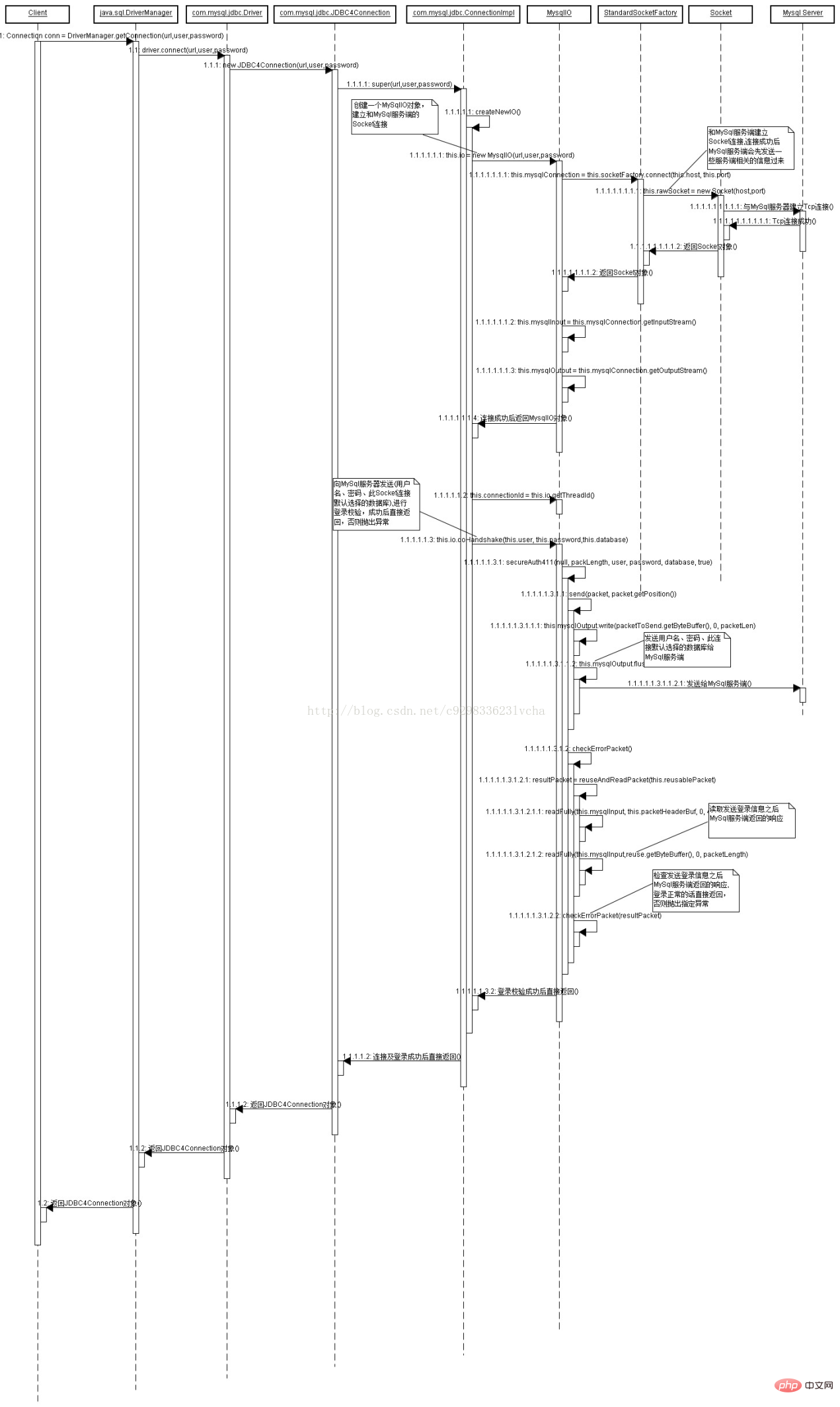
(Picture taken from: https://blog.csdn.net/c929833623lvcha/article/details/44517245)
After I studied for a while, I found that these two ideas All wrong. Specifically:
I wrote a simple jdbc query:
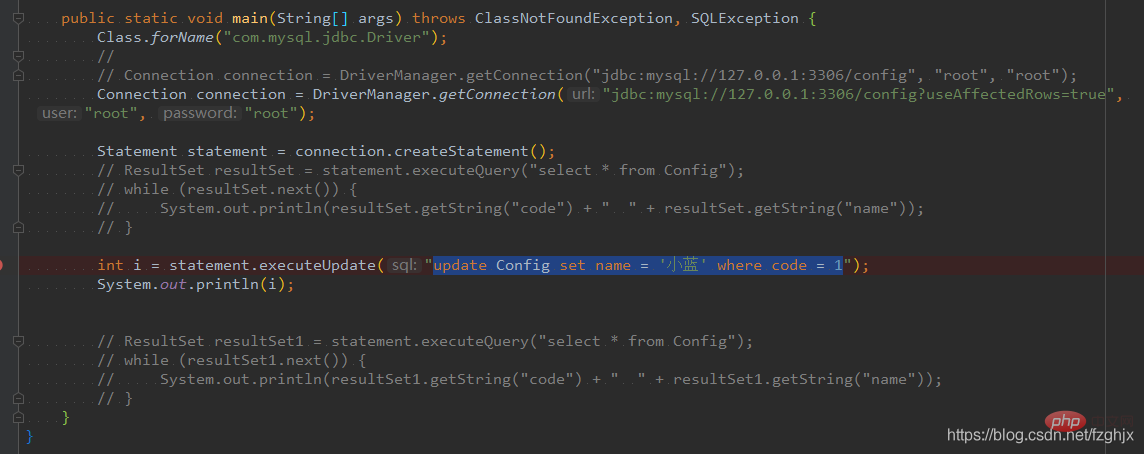
1, establish Connection
According to the source code and tracking, when mysql establishes a connection, the parameter useAffectedRows=true will be set as the connection attribute.
Follow down in
Connection connection = DriverManager.getConnection("jdbc:mysql://gitlab.fzghjx.com:3306/cron?useAffectedRows=true", "root", "root");:
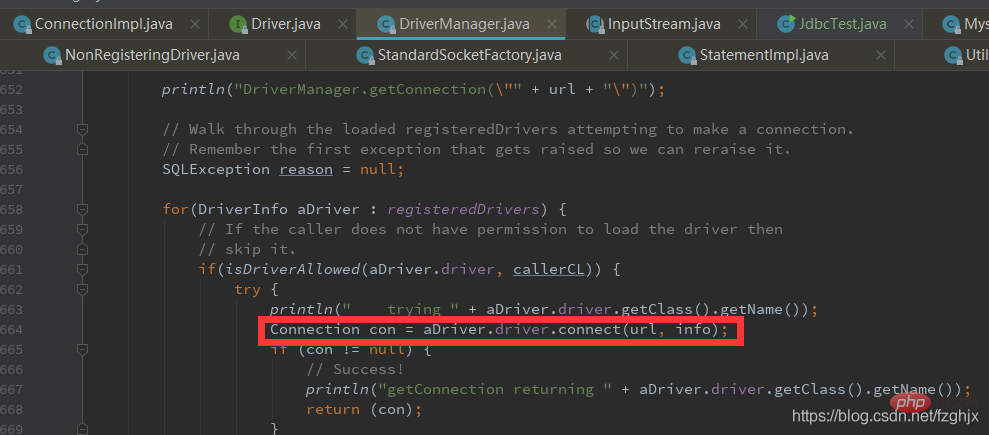
Continue: The connect method is: java.sql.Driver#connect, and the implementation is: com.mysql.jdbc.NonRegisteringDriver#connect
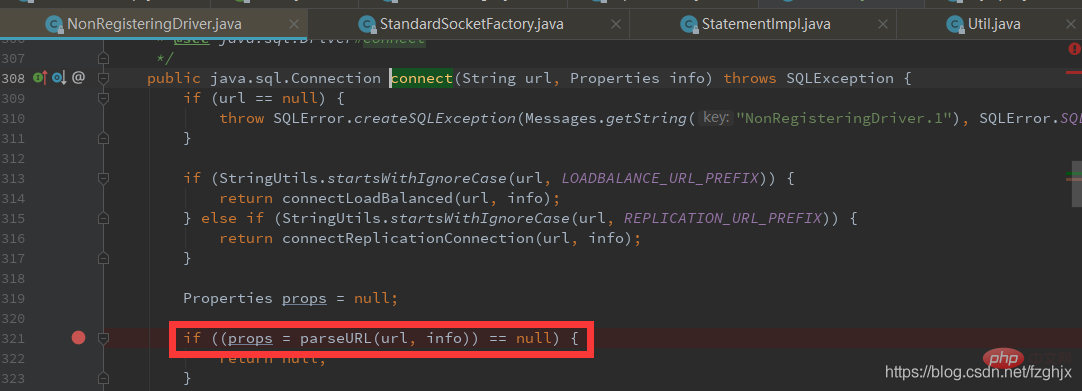
 ##Here is a reflection, args is
##Here is a reflection, args is
The constructor of JDBC is used:
 #The constructor of JDBC is:
#The constructor of JDBC is:
public JDBC4Connection(String hostToConnectTo, int portToConnectTo, Properties info, String databaseToConnectTo, String url) throws SQLException {
super(hostToConnectTo, portToConnectTo, info, databaseToConnectTo, url);
}Look up, it is the constructor of ConnectionImp:
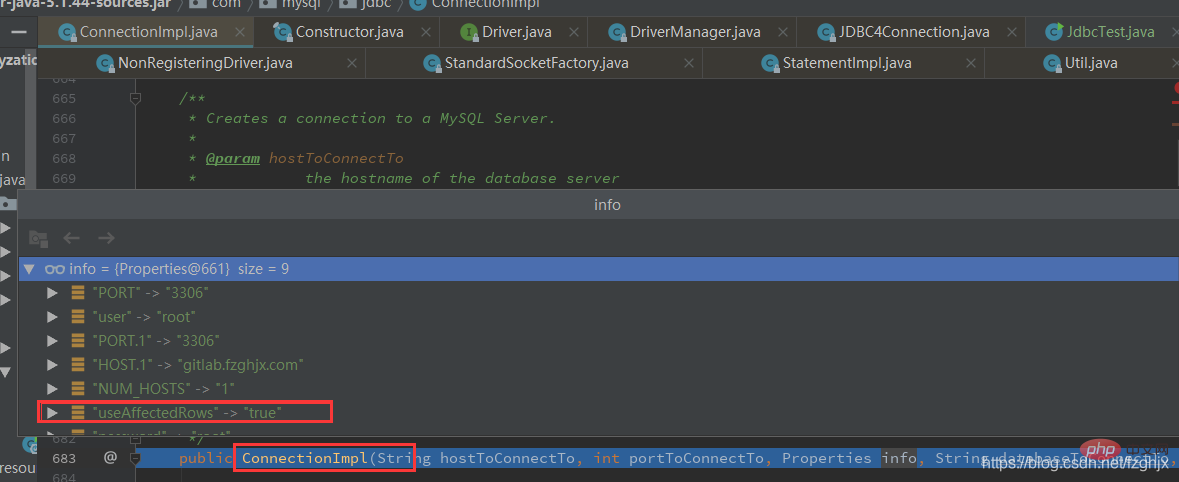 (By the way: The isolation level of the transaction is set to 2 here, and the read is committed)
(By the way: The isolation level of the transaction is set to 2 here, and the read is committed)
 In In this constructor, the value of useAffectedRows is initialized into the connection:
In In this constructor, the value of useAffectedRows is initialized into the connection:
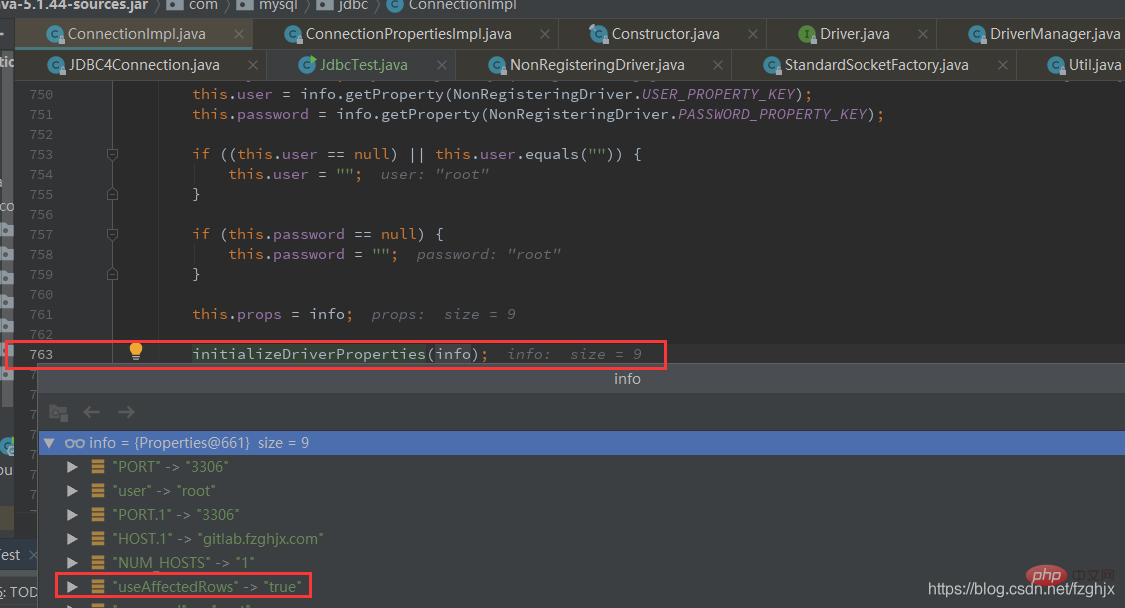 There are 206 properties to be set, useAffectedRows is ranked 190th (different mysql-connect -java version, location is different).
There are 206 properties to be set, useAffectedRows is ranked 190th (different mysql-connect -java version, location is different).
After the settings are completed:
##2, create MysqlIO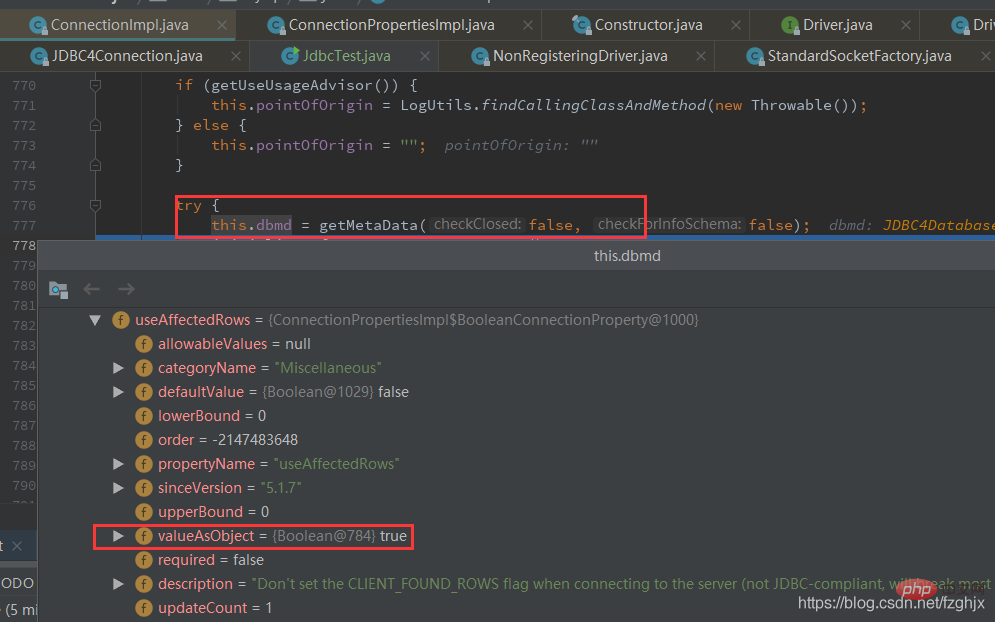

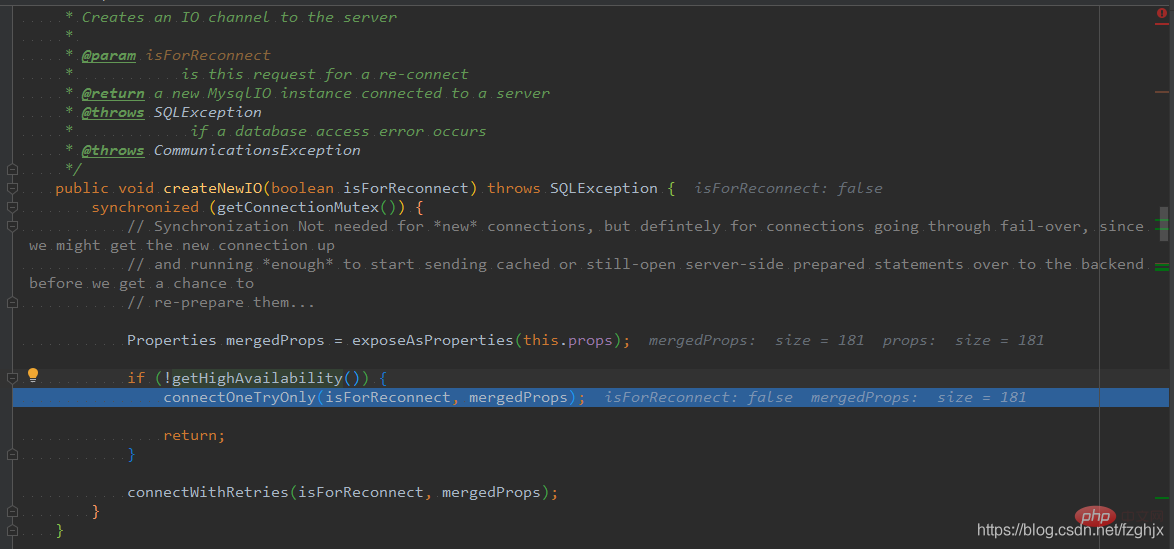
There is a "high availability" option. If so, a retry IO link will be created. Otherwise, create an IO link that is tried only once, and will not be retried if it fails. This option is also enabled in the URL by setting: autoReconnect=true.
3, handshake connection with msyql server
The connection IO process is actually to create a MysqlIO and then start the handshake:
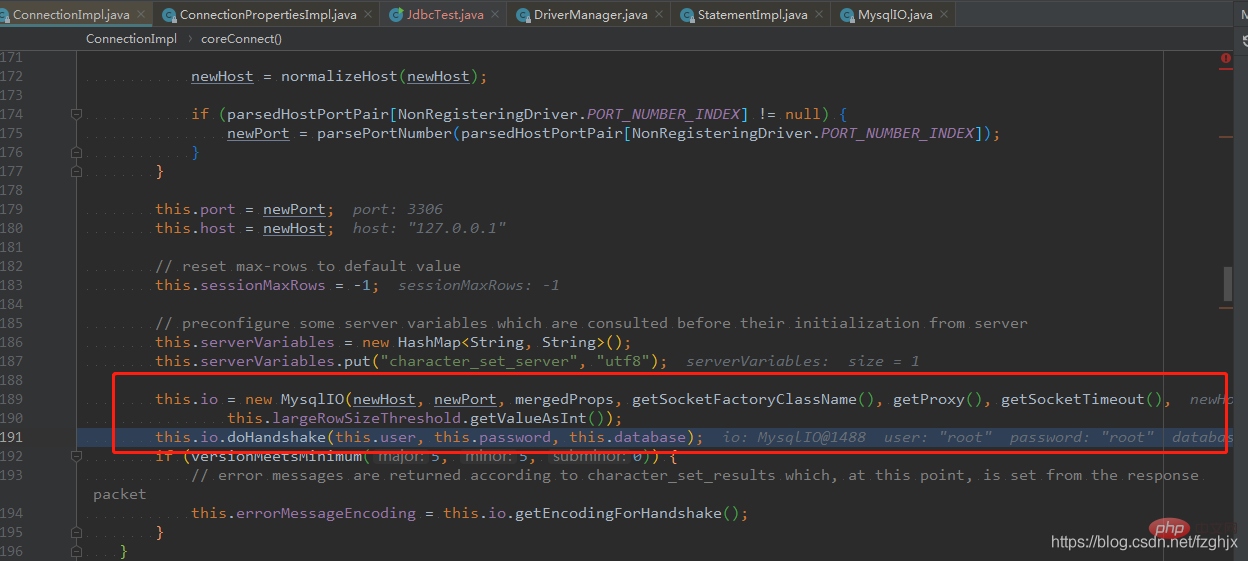
The key points Already: In the doHandshake method, the useAffectedRows option is set: (com.mysql.jdbc.MysqlIO#doHandshake)
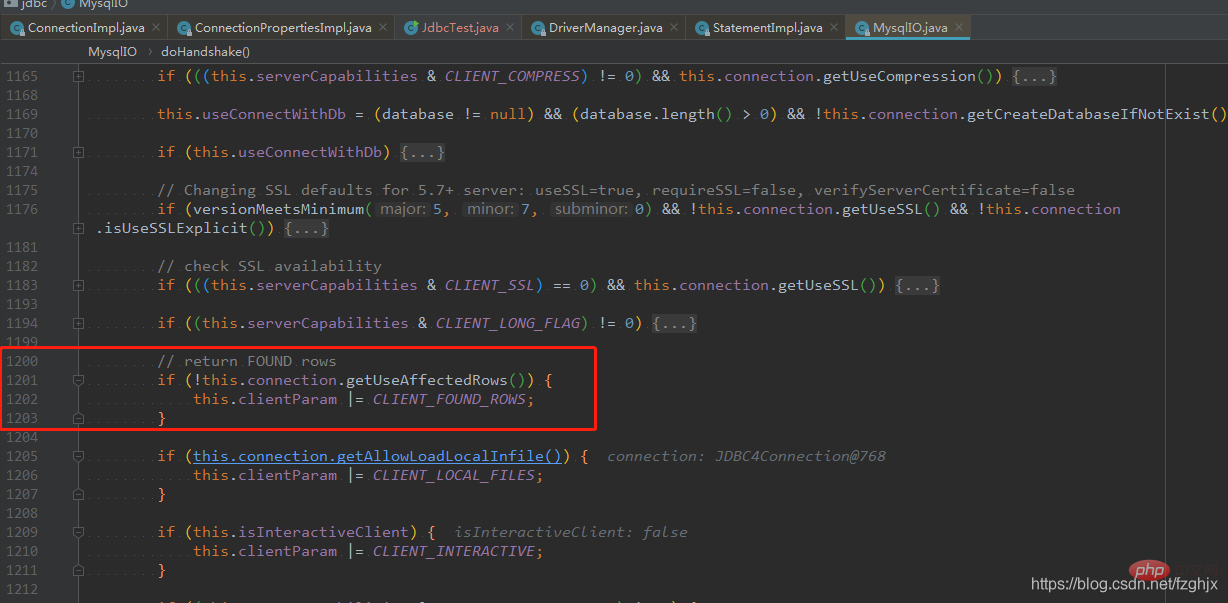

or operations. If useAffectsRows, no or operations will be performed.
After setting, send it to the mysql server through the mysqlOutput socket:
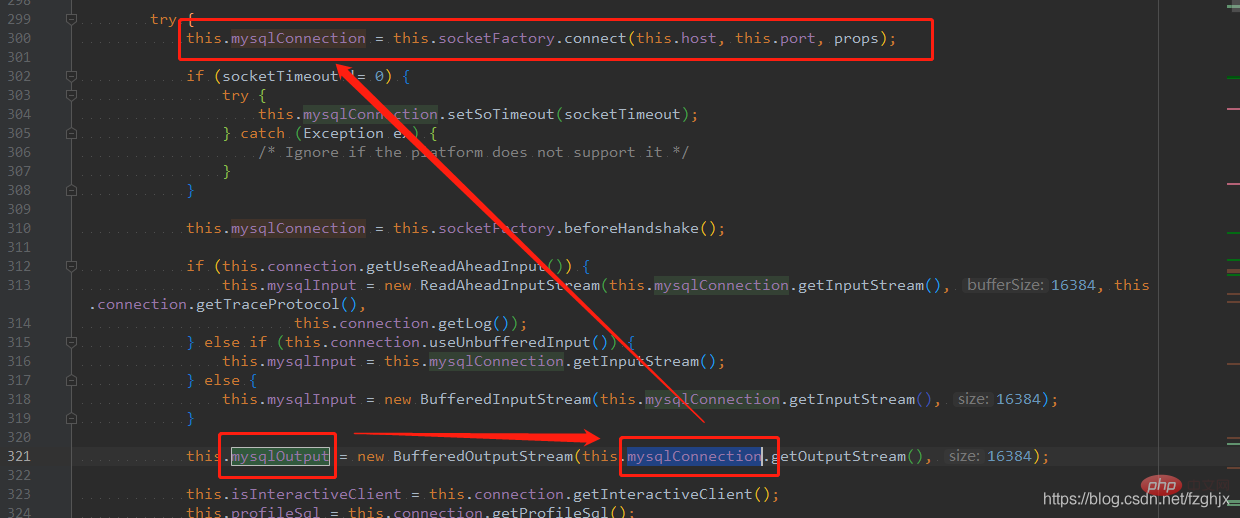
useAffectedRows=true:
Send request To mysql server:
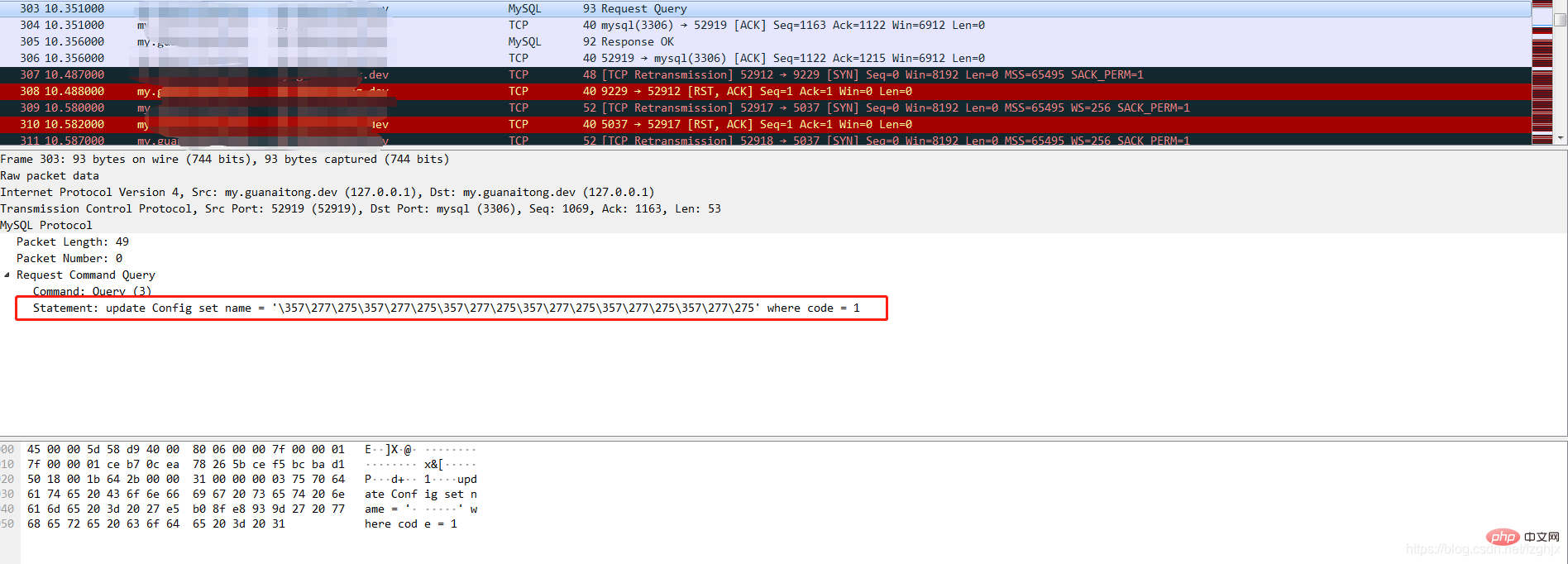
Response from mysql server:
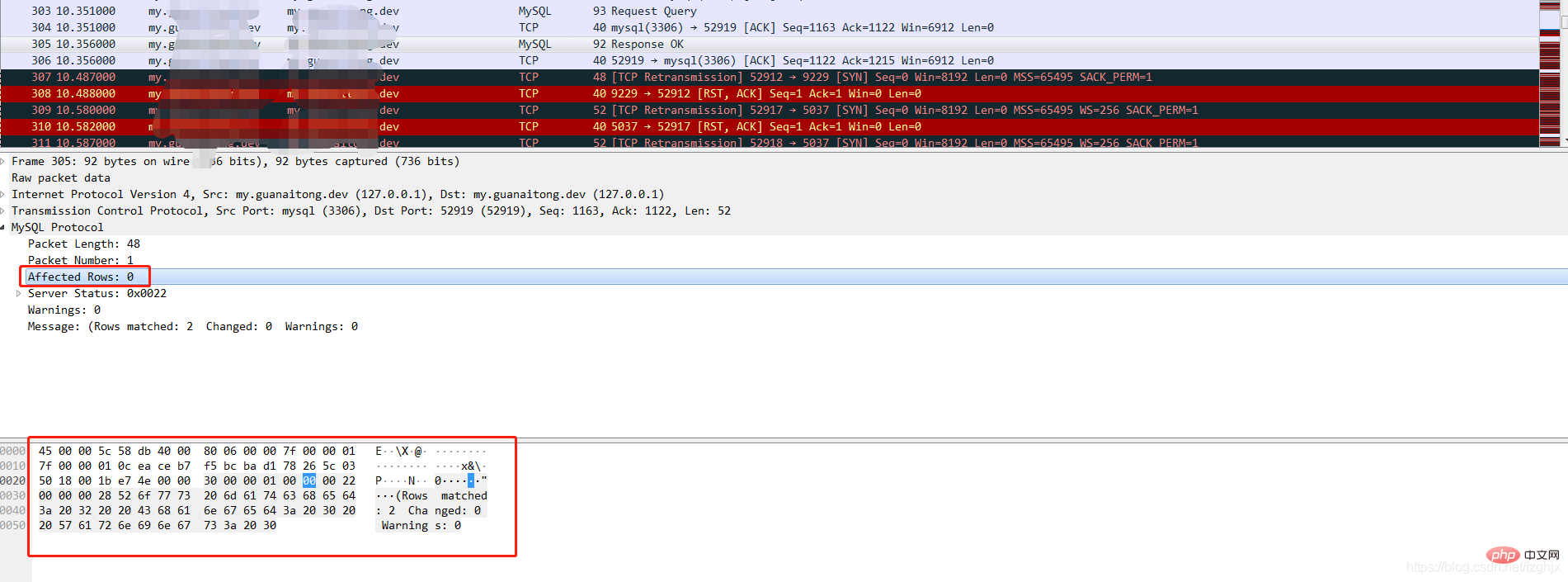
Send a request to the mysql server:
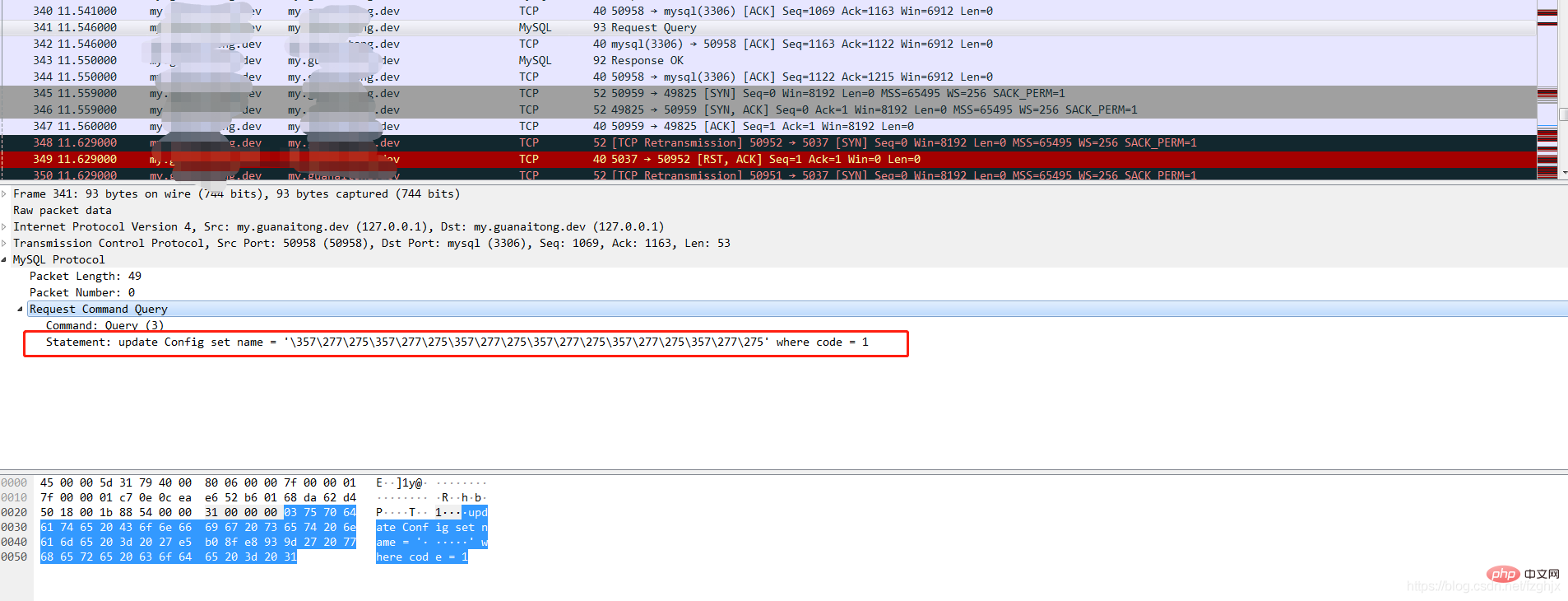 ##Mysql server’s response:
##Mysql server’s response:
As can be seen from the above message, when 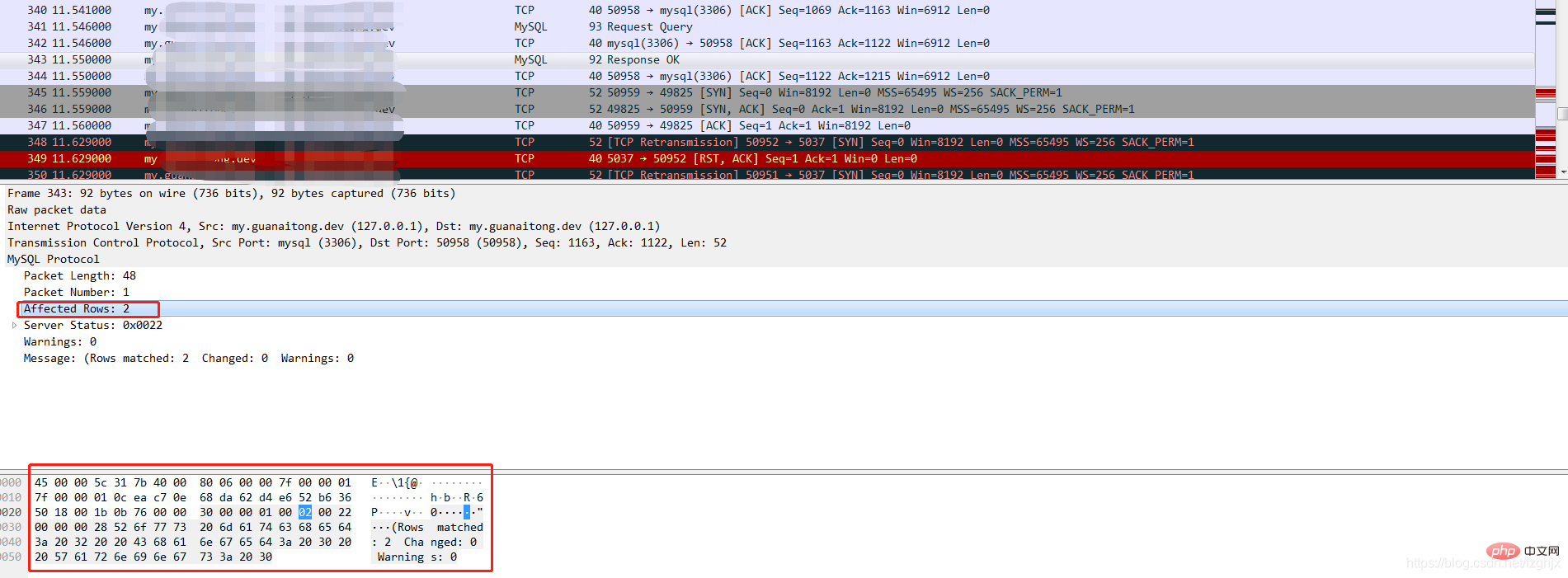 useAffectedRows is true and false, the return value of the msyql server is different
useAffectedRows is true and false, the return value of the msyql server is different
Recommended learning: mysql video tutorial
The above is the detailed content of What does the update statement in mysql return?. For more information, please follow other related articles on the PHP Chinese website!

Hot AI Tools

Undresser.AI Undress
AI-powered app for creating realistic nude photos

AI Clothes Remover
Online AI tool for removing clothes from photos.

Undress AI Tool
Undress images for free

Clothoff.io
AI clothes remover

Video Face Swap
Swap faces in any video effortlessly with our completely free AI face swap tool!

Hot Article

Hot Tools

Notepad++7.3.1
Easy-to-use and free code editor

SublimeText3 Chinese version
Chinese version, very easy to use

Zend Studio 13.0.1
Powerful PHP integrated development environment

Dreamweaver CS6
Visual web development tools

SublimeText3 Mac version
God-level code editing software (SublimeText3)

Hot Topics
 MySQL's Role: Databases in Web Applications
Apr 17, 2025 am 12:23 AM
MySQL's Role: Databases in Web Applications
Apr 17, 2025 am 12:23 AM
The main role of MySQL in web applications is to store and manage data. 1.MySQL efficiently processes user information, product catalogs, transaction records and other data. 2. Through SQL query, developers can extract information from the database to generate dynamic content. 3.MySQL works based on the client-server model to ensure acceptable query speed.
 Laravel Introduction Example
Apr 18, 2025 pm 12:45 PM
Laravel Introduction Example
Apr 18, 2025 pm 12:45 PM
Laravel is a PHP framework for easy building of web applications. It provides a range of powerful features including: Installation: Install the Laravel CLI globally with Composer and create applications in the project directory. Routing: Define the relationship between the URL and the handler in routes/web.php. View: Create a view in resources/views to render the application's interface. Database Integration: Provides out-of-the-box integration with databases such as MySQL and uses migration to create and modify tables. Model and Controller: The model represents the database entity and the controller processes HTTP requests.
 How to start mysql by docker
Apr 15, 2025 pm 12:09 PM
How to start mysql by docker
Apr 15, 2025 pm 12:09 PM
The process of starting MySQL in Docker consists of the following steps: Pull the MySQL image to create and start the container, set the root user password, and map the port verification connection Create the database and the user grants all permissions to the database
 Solve database connection problem: a practical case of using minii/db library
Apr 18, 2025 am 07:09 AM
Solve database connection problem: a practical case of using minii/db library
Apr 18, 2025 am 07:09 AM
I encountered a tricky problem when developing a small application: the need to quickly integrate a lightweight database operation library. After trying multiple libraries, I found that they either have too much functionality or are not very compatible. Eventually, I found minii/db, a simplified version based on Yii2 that solved my problem perfectly.
 How to install mysql in centos7
Apr 14, 2025 pm 08:30 PM
How to install mysql in centos7
Apr 14, 2025 pm 08:30 PM
The key to installing MySQL elegantly is to add the official MySQL repository. The specific steps are as follows: Download the MySQL official GPG key to prevent phishing attacks. Add MySQL repository file: rpm -Uvh https://dev.mysql.com/get/mysql80-community-release-el7-3.noarch.rpm Update yum repository cache: yum update installation MySQL: yum install mysql-server startup MySQL service: systemctl start mysqld set up booting
 Centos install mysql
Apr 14, 2025 pm 08:09 PM
Centos install mysql
Apr 14, 2025 pm 08:09 PM
Installing MySQL on CentOS involves the following steps: Adding the appropriate MySQL yum source. Execute the yum install mysql-server command to install the MySQL server. Use the mysql_secure_installation command to make security settings, such as setting the root user password. Customize the MySQL configuration file as needed. Tune MySQL parameters and optimize databases for performance.
 Laravel framework installation method
Apr 18, 2025 pm 12:54 PM
Laravel framework installation method
Apr 18, 2025 pm 12:54 PM
Article summary: This article provides detailed step-by-step instructions to guide readers on how to easily install the Laravel framework. Laravel is a powerful PHP framework that speeds up the development process of web applications. This tutorial covers the installation process from system requirements to configuring databases and setting up routing. By following these steps, readers can quickly and efficiently lay a solid foundation for their Laravel project.
 MySQL and phpMyAdmin: Core Features and Functions
Apr 22, 2025 am 12:12 AM
MySQL and phpMyAdmin: Core Features and Functions
Apr 22, 2025 am 12:12 AM
MySQL and phpMyAdmin are powerful database management tools. 1) MySQL is used to create databases and tables, and to execute DML and SQL queries. 2) phpMyAdmin provides an intuitive interface for database management, table structure management, data operations and user permission management.






